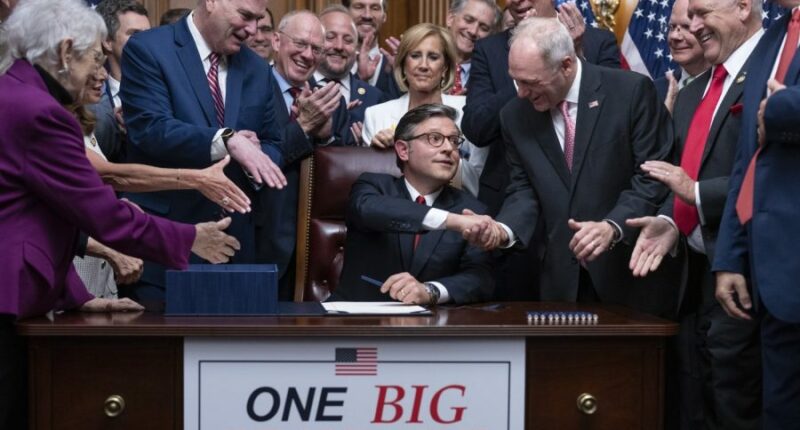Share this @internewscast.com

With the GOP’s “big, beautiful bill” passed and signed, wealthy Americans are poised to receive significant tax breaks partly offset by steep cuts to social welfare programs.
The bill makes 2017 tax breaks from Trump’s first term permanent, while adding some new tax breaks, like no taxes on tips up to $25,000 and a “senior deduction” that will allow more people over 65 to avoid Social Security taxes.
Some policy analyses show that the tax cuts for lower earners may be offset by the new costs they incur from lost support for health care and food.
Most households about 85 percent would get a tax cut in 2026, according to an analysis from the Tax Policy Center. But while many of the bill’s changes are permanent, other provisions, such as the new deduction for seniors, are set to expire within a couple of years. The center estimates that by 2030, only about 70 percent of households would continue to have a tax break.
The center also estimates that nearly 60 percent of the tax benefits would go to those in the top quintile of annual incomes (about $217,000 or more). Those households would receive an average tax cut of $12,500.
While other estimates of the bill’s tax changes by income bracket vary, they largely agree that the tax breaks generally increase moving up the income ladder.
Here’s how the bill would impact your taxes.
High-income earners ($217,000)
For taxes filed in 2026, households making between $217,000 and $318,000 would see their after-tax income rise 2.6 percent, a tax break of about $5,400. For Americans making $318,000 to $460,000 in the 90th to 95th percentile that cut would be about $8,900, or a 3.1 percent increase to their after-tax income.
Those making between $460,000 and $1.1 million would receive the biggest break: a $21,000 change, increasing their after-tax income by 4.4 percent.
The top one percent and the top 0.1 percent households making more than $1.1 million or $5 million would see their after-tax incomes increase 3.5 percent and 3.2 percent, respectively.
Middle-income earners ($50,000-$200,000)
The tax breaks for the rest of Americans are far less substantial, according to the Center’s estimates.
Households making between $100,000 and $200,000 a year would see their after-tax income increase by 2.5 percent, about a $3,000 tax break. For those making between $75,000 and $100,000, the tax cut as a percentage of income is similar at about $1,700 or 2.3 percent.
Americans earning between $50,000 and $75,000 will have a $1,000 tax break.
Low-income earners ($50,000)
For those making between $40,000 and $50,000, that cut will be around $630. Those are after-tax boosts of 1.9 percent and 1.5 percent, respectively.
Those in the bottom quintile of incomes, making below $34,600 a year, would see their taxes decrease by about $150, or a 0.8 percent increase in their after-tax income.
However, benefits that low-income Americans could see in tax breaks offset by the bill’s sweeping cuts to Medicaid and food stamps.
Federal Medicaid spending is estimated to decrease by about $1 trillion, resulting in about 12 million low-income Americans losing their health insurance by 2034, according to the nonpartisan Congressional Budget Office.
The bill also includes work requirements for Medicaid and for SNAP benefits, also known as food stamps, which could disenroll millions from both programs.
Other new tax cuts
Many of the bill’s tax deductions will start in 2025, and some of them will be permanent. That includes a permanent increase in the child tax credit to $2,200 and an increase in the standard deduction by $750.
Other new tax cuts, especially those core to Trump’s campaign promises, are set to expire in a couple of years. A new $6,000 deduction for Americans over 65 will last only through 2028. A $25,000 deduction designed to eliminate taxes on tips will also only last for three years. The same goes for another $12,500 deduction meant to curb taxes on overtime.
The amount that households can deduct in state and local taxes on their federal returns, known as the SALT cap, will also increase to $40,000. Previously capped at $10,000, SALT deductions were a major sticking point among House Republicans during the first rounds of negotiations on the bill in May.
All these cuts are expensive, although estimates vary. The nonpartisan Congressional Budget Office says the bill would add $3.4 trillion to the debt over ten years, while the Committee for a Responsible Federal Budget said it would add $4.1 trillion. The conservative Cato Institute put the figure as high as $6 trillion.
Republicans who claim to be fiscal hawks railed against the bill’s impact on the national debt, saying it would inflict pain on future generations, but ultimately voted for it.













